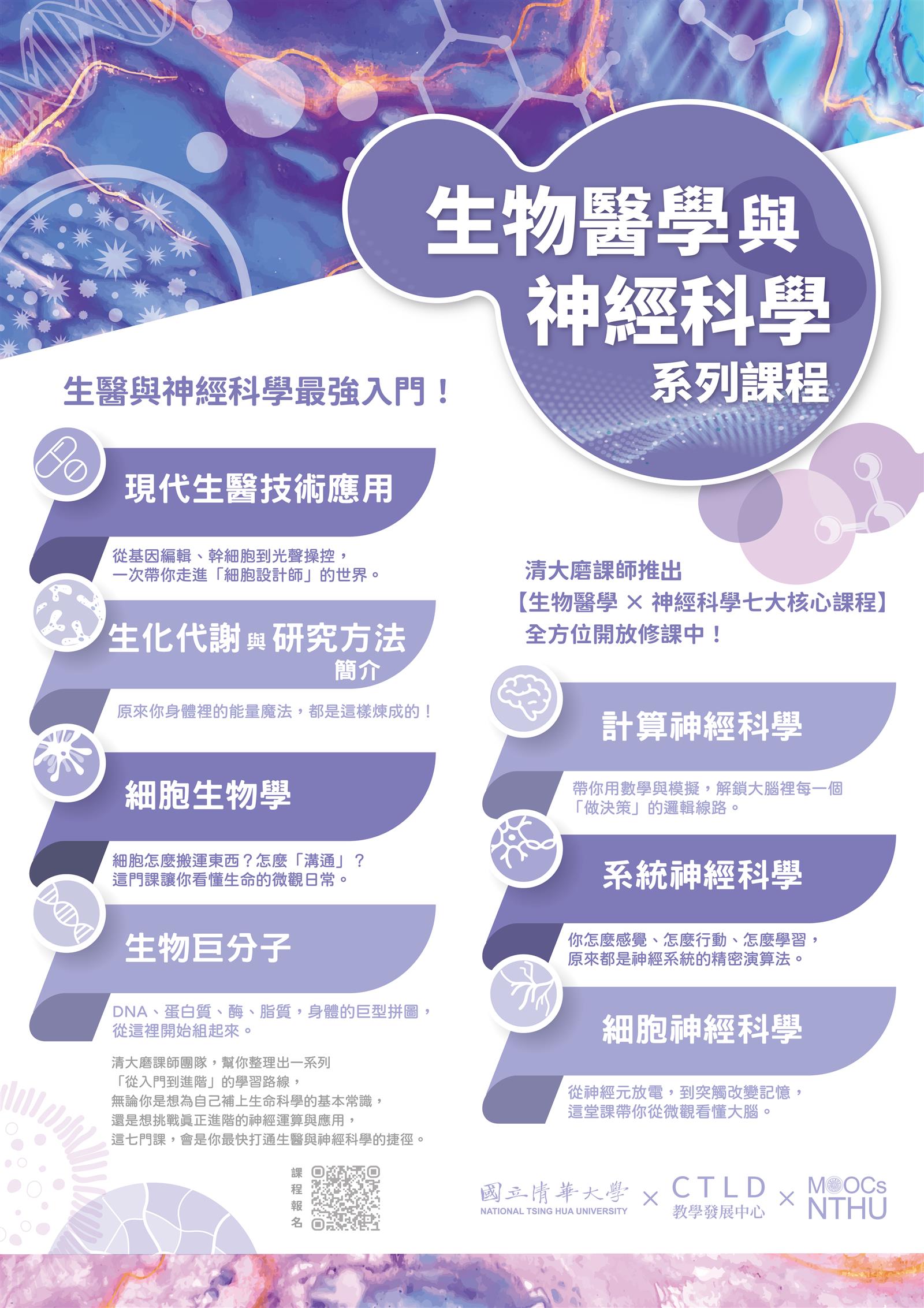說明:
一、旨揭課程為清華大學磨課師平台開設之數位課程,特以「生物醫學 × 神經科學」為主題進行整體宣傳,包含下列七門課程,內容如下:
(一)《現代生醫技術應用》:介紹基因編輯、幹細胞與免疫療法等現代生醫技術,掌握醫療應用的實作核心。
(二)《生化代謝與研究方法簡介》:講解細胞代謝運作,並結合研究實務,建立生醫實驗的基本能力。
(三)《細胞生物學》:從細胞結構與功能出發,了解細胞訊號與運輸機制,奠定生命科學基礎。
(四)《生物巨分子》:聚焦DNA、蛋白質、酶與脂質等生物巨分子,理解身體運作的核心單位。
(五)《計算神經科學》:以數學模型與模擬工具,解析神經運算邏輯,適合跨域應用與進階學習。
(六)《系統神經科學》:介紹感覺、運動與認知的神經系統架構,建構整合性神經科學視野。
(七)《細胞神經科學》:探討神經元與突觸的運作機制,了解細胞層級的神經功能與行為表現。
二、上述課程均於「清華大學磨課師(NTHU MOOCs)」平台免費開放修習,無需報名費用,修課者可依自身時間彈性學習。
三、主題介紹及詳情已公布於清華大學教學發展中心網站,詳情請參閱:https://ctld.site.nthu.edu.tw/p/406-1217-293344,r6814.php?Lang=zh-tw。
四、課程資訊與報名連結如下:
(一)現代生醫技術應用: https://mooc.nthu.edu.tw/course/info/398。
(二)生化代謝與研究方法簡介: https://mooc.nthu.edu.tw/course/info/377。
(三)細胞生物學: https://mooc.nthu.edu.tw/course/info/378。
(四)生物巨分子: https://mooc.nthu.edu.tw/course/info/379。
(五)計算神經科學: https://mooc.nthu.edu.tw/course/info/365。
(六)系統神經科學: https://mooc.nthu.edu.tw/course/info/372。
(七)細胞神經科學: https://mooc.nthu.edu.tw/course/info/373。
五、轉知所屬學生及有興趣者踴躍參與,以增進對生物醫學與神經科學之基礎認識與實務應用理解,並善加利用本數位學習資源。
六、如有課程相關問題,請洽清華大學教學發展中心陳小姐,電話:(03)5715131分機35208,Email:iyu@mx.nthu.edu.tw。
Description:
1. This course is a digital course offered on the Tsinghua University Course Master platform. It is promoted under the theme of "Biomedicine × Neuroscience" and includes the following seven courses:
(1) "Modern Biomedical Technology Applications": Introduces modern biomedical technologies such as gene editing, stem cells, and immunotherapy, and mastering the core practical applications of medical applications.
(2) "Introduction to Biochemical Metabolism and Research Methods": Explains the operation of cellular metabolism and integrates research practices to build basic biomedical experimental capabilities.
(3) "Cell Biology": Starting from the structure and function of cells, understands cell signaling and transport mechanisms, laying the foundation for life sciences.
(4) "Biological Macromolecules": Focuses on biological macromolecules such as DNA, proteins, enzymes, and lipids, understanding the core units of body function.
(5) "Computational Neuroscience": Uses mathematical models and simulation tools to analyze neural computational logic, suitable for cross-domain applications and advanced learning.
(6) "Systems Neuroscience": Introduces the neural system architecture of sensation, movement, and cognition, building an integrative neuroscience perspective. (VII) "Cellular Neuroscience": Explores the operating mechanisms of neurons and synapses, understanding neural function and behavioral manifestations at the cellular level.
II. All of the above courses are available free of charge on the "Tsinghua University MOOCs" platform. There is no registration fee, and participants can study flexibly according to their own schedule.
III. The topic introduction and details are available on the Tsinghua University Center for Teaching and Learning website. For details, please visit: https://ctld.site.nthu.edu.tw/p/406-1217-293344,r6814.php?Lang=zh-tw.
IV. Course information and registration links are as follows:
(I) Modern Biomedical Technology Applications: https://mooc.nthu.edu.tw/course/info/398.
(II) Introduction to Biochemical Metabolism and Research Methods: https://mooc.nthu.edu.tw/course/info/377.
(3) Cell Biology: https://mooc.nthu.edu.tw/course/info/378.
(4) Biomacromolecules: https://mooc.nthu.edu.tw/course/info/379.
(5) Computational Neuroscience: https://mooc.nthu.edu.tw/course/info/365.
(6) Systems Neuroscience: https://mooc.nthu.edu.tw/course/info/372.
(7) Cellular Neuroscience: https://mooc.nthu.edu.tw/course/info/373.
5. We hereby inform our students and interested individuals to actively participate in this course to enhance their understanding of the fundamentals and practical applications of biomedical science and neuroscience, and to make effective use of this digital learning resource.
6. If you have any questions about the course, please contact Ms. Chen at the Teaching Development Center of Tsinghua University, Tel: (03) 5715131 ext. 35208, Email: iyu@mx.nthu.edu.tw.
